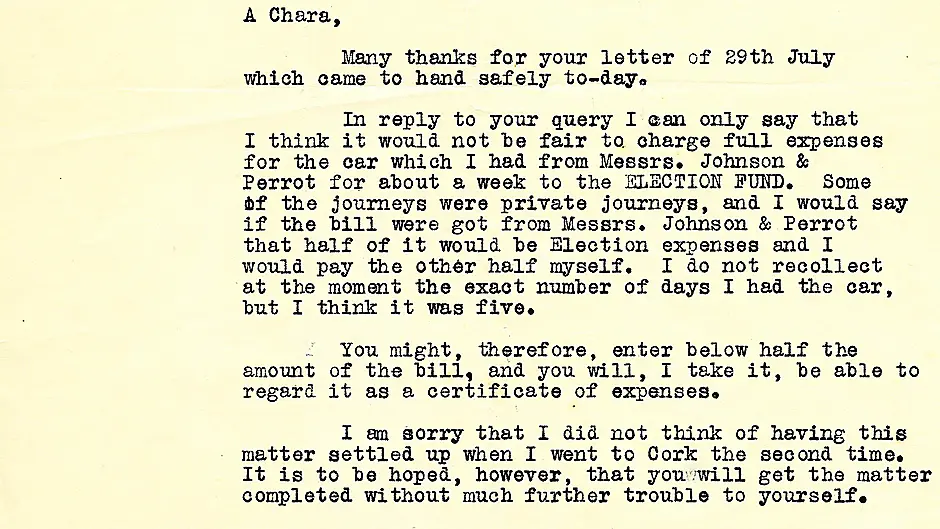Skibbereen man Thomas Healy, election agent to Michael Collins, was also a trusted confidant, writes his grand-daughter Liz Cassidy. And it is likely the two became acquainted through the The Southern Star
THOMAS Healy (1895 – 1957) formerly of Lurriga House, Abbeystrowry and late of North Street, Skibbereen, acted as Michael Collins’ election agent in the parliamentary and local elections between 1918 and 1922.
A son of the late Joseph J Healy, solicitor, Thomas became a friend and confidant of Michael Collins, and first served as his election agent when Collins won a seat in the Cork South constituency in the general election of 1918.
Undoubtedly, the men first became acquainted through a mutual interest in The Southern Star, where Collins was a shareholder and Thomas’ late father was a founding director. Healy’s father had moved from Coachford, North Cork, and set up his legal practice JJ Healy & Co Solicitors in Skibbereen in 1881.
A decade later, in 1891, he accepted an invitation from Monsignor John O’Leary to join a consortium of 10 shareholders to take over the management of the recently established newspaper, The Southern Star. His brother John Healy, a farmer from Clonmoyle, Coachford, also became a shareholder. When the first meeting was held to incorporate The Southern Star Ltd on May 6th, 1891, JJ Healy was initially in the chair and he became one of the first directors. He continued to serve on the board of directors for over 20 years.
During the War of Independence, Thomas Healy held the rank of captain and was appointed as intelligence officer to the Fifth Bantry Battalion of the Third Cork Brigade, under commanding officer Commandant Liam Deasy. Healy became one of Collins’ most trusted intelligence officers in the West Cork area and was tasked by Collins to take statements about atrocities in the area for the American Commission of Inquiry, 1920 – 1921.
In a handwritten letter, dated October 24th 1920, Collins stated that the American Commission ‘is to enquire into allegations of reprisals and atrocities against the English forces by ourselves’ and he directs Healy to ‘go to Glandore and get statements from the people concerned … the facts must be above question. It is necessary that a solicitor should take them so that we can rely upon the detail.’ Collins also instructs Healy ‘in the event of any other similar actions by the enemy forces or agents I should like you to take statement also.’
Following the Truce of July 1921, liaison officers were appointed across the country to ensure that the terms of the truce between the British and Irish governments were upheld. Thomas Healy was appointed liaison officer for Cork West Riding. His offices were located at South Main Street in Bandon.
Healy continued to act as election agent for Collins and in this capacity, he managed the election funds. Collins attended various election rallies in West Cork during 1922, including a large meeting in the Square in Skibbereen, on March 17th, for which he required transport to travel between locations. The transport arrangements and the expenses for same were overseen by Healy. Collins was subsequently elected a Teachta Dála (TD) in the General Election of June 1922.
On foot of an enquiry from Healy to Collins on July 29th 1922 relating to expenses for motor hire, Collins replied ‘… it would not be fair to charge full expenses for the car which I had from Messrs Johnson & Perrot [sic] for about a week to the ELECTION FUND. Some of the journeys were private journeys … half of it [the bill] would be Election expenses and I would pay the other half myself.’
This correspondence, showing the integrity of Collins in his dealings with public finances, proved to be the last letter that Healy received from Collins, as within three weeks, on August 22nd 1922, Collins was shot dead in an ambush at Béal na Bláth, during the height of the Irish Civil War.
Healy last saw his friend and ‘chief’ that fateful day when Collins attended a meeting of National Army officers at the Eldon Hotel in Skibbereen. Healy also attended that meeting and is clearly visible among the crowd that surrounded Collins as he left the Eldon and climbed into the touring car outside the hotel.
During the formation years of the National Army, Óglaigh na hÉireann, Thomas Healy was one of the commissioned officers who helped to lay the administrative foundation of the forces. He retired from military service in 1923 and returned to the law in his late father’s practice, J J Healy & Co Solicitors in Skibbereen. He was honoured with the appointment as first state solicitor for County Cork, West Riding, in 1923, a position he held up to the time of his death in 1957.
Aside from his military and legal careers, Thomas also had an enduring relationship with The Southern Star. Throughout his career, from the time he was first appointed to the board in 1922, Thomas and The Southern Star were closely connected. The Southern Star Centenary Supplement 1889 – 1989 notes that the Healy connection with the Star, firstly through JJ Healy and subsequently his son, Thomas, was extremely lengthy. The connection spanned almost six decades, from 1891–1949, close on 60 years of dedicated service on the board, with a short break following the death of the elder and a short-lived resignation of the younger during the 1930s.
Thomas held the position of chairman, alternating it with Seán Buckley TD, from 1924 to 1928. At various stages he was director and managing director, and was involved in various progressive proposals. He was heavily involved in the takeover of the Skibbereen Eagle in 1929, when he presided over that process as solicitor for The Southern Star.
In 1930 he was appointed managing director and he was to the fore in the introduction of the new printing press, the Cossar ‘flatbed’, installed in 1932.
In 1933 he resigned his position as managing director in protest at what was considered to be an abuse of the paper for political ends, as a result of ‘undue aggrandisement of the Cumann na nGaedheal party’, a conflict of interest deemed unacceptable. He did not become heavily involved in the Star again until 1942, following the death of then managing director James Duggan. At that time, Thomas became general manager and his close involvement with The Southern Star continued until the late forties, when his shareholding was sold to Joseph O’Regan.
• There is a more detailed article about Thomas Healy and his father JJ Healy published in the current edition of the Skibbereen Historical Journal, Vol. 18, 2022.








